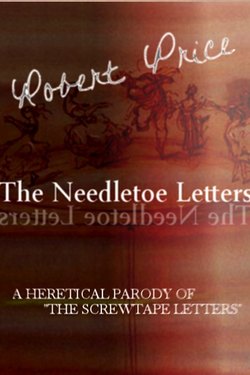Читать книгу The Needletoe Letters - Robert M. Price - Страница 3
На сайте Литреса книга снята с продажи.
I
ОглавлениеMy dear Wiltwing,
Imagine my surprise (I do not say “delight”) to learn of your requested transfer to my division. You must pardon me if I suspect it was for reasons other than the affection due an uncle from his… distant… nephew. The word is that you rather failed to keep your last few charges safe in their cocoons of blithe believing. I gladly admit that you probably should not have been so soon assigned to our Moroni division, where the absurdities we must keep them believing are so titanic. Sacred underwear! How I would love to know whose mischievous invention that was! But then no one would claim credit for it then and no one is likely to do so now.
It may surprise you, though, to learn how little responsible for your shortcomings I hold you. Truth to tell, the quality of angelic education is simply not what it once was, and, frankly, given the waning quality of angelic oversight, the roaring success of atheism and secularism in our day comes as little surprise. As you are now under my supervision, an agent of the Bull-head Cherub division dedicated to oversight of the Evangelical Protestants, I trust you will have the patience for a bit of on-the-job training. It is remedial in character, but better to get one’s training late than never.
Looking over your reports from case files past, I notice at once a major point of confusion. Whoever told you, my boy, that our task was to influence our charges to do good and benevolent deeds? Of course we do not discourage good deeds, but in and of themselves they do us no good. What matters to us is that the little fleshlings feel proud of what they have done, for it is not morality but rather religious feelings that nourish us. Animalistic passions are alien to us and cannot benefit us. It is the expenditure of a more refined emotional substance that strengthens us like milk for a baby. Indeed, had you been more adept at eliciting such feelings, you would already have found renewed strength and would scarcely require the coaching I now offer.
But, you will say, are we not tirelessly engaged in moral exhortation? What of the conscience and the indefatigable use we make of it? I fear, dear boy, you fail to get the point. Our strategy here is to create a vicious circle to keep the mortals suffering from pious guilt. We make great demands for a sanctified life together with tall promises of enabling such behavior. But the pitiful limitations of our human charges seldom make it possible for them to follow through on their tearful resolutions to repent. And when they do momentarily “overcome,” when for a shining instant it appears to them that they have made the breakthrough to the “victorious life,” they will almost immediately “backslide” into default mode, which we have taught them to regard as “sinful” though it is only the inevitable distraction from the unseen and imaginary by token of the pressing demands of the visible world. And so their momentary “victory” lives on in memory primarily as one more pointing finger of rebuke, the high water mark from which they have declined.
And the greater and more frequent these maneuverings, the stronger and fatter we grow! Follow my avuncular counsel, Wiltwing my lad, and you will soon see the truth of the matter.
Yes, I think you overestimate the importance of the moral sphere, vital as it undoubtedly is. At least its equal is the intellect. Our best creative writers and inventors have been constantly busy spinning new rationalizations to feed our charges, I mean basically excuses to reassure them that they are justified in believing the very things they want most to believe. The improbable convenience of this arrangement never seems to dawn on them, I am happy to say. I mean, most of them do not even think to question the luck of being born in the section of the vast earth where the “true” religion prevails! After that, you might suppose we have but little to do. But in fact, the implausibilities of the creeds we feed them are so strong, and there is such a barrage of them in a typical Sunday sermon, coming fast and thick between invocation and benediction, that sooner or later even the take-it-for-granted believer begins to wonder—like a child beginning to doubt Santa Claus. We have to be ready with a counter-argument. And they need not be very cogent (how could they be?), seeing that the believer is not looking for the truth but for reconfirmation of what he already dearly wants to believe.
Wiltwing, I lay considerable stress on this, the cognitive side of their faith and of our task protecting it, for one simple reason: of all the religious sentiment served up to us on the banqueting table of heaven, the tastiest as well as the most nourishing morsel is the delicious Sacrifice of the Intellect, and of this delectable treat there seems to be no dearth.
Your affable uncle,
Needletoe
